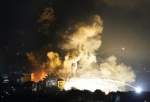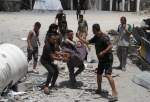Jens Laerke, a spokesman for the UN humanitarian agency in Geneva, told reporters on Tuesday that Israeli strikes had forced more than 52,000 Palestinians to abandon their homes in Gaza, with 47,000 of the displaced people seeking shelter in 58 UN-run schools in the besieged area.
Laerke said 132 buildings had been destroyed and 316 had been severely damaged, including six hospitals and nine primary healthcare centers as well as a desalination plant, affecting access to drinking water for about 250,000 people.
The OCHA spokesman underlined that the UN agency and its humanitarian partners were trying to provide food and other assistance to displaced families in Gaza, while calling on the Israeli regime to open a border crossing for humanitarian supplies to the besieged coastal enclave.
The World Health Organization has already raised the alarm about a severe shortage of medical supplies, a risk of water-borne diseases, and the spread of COVID-19 among the displaced people in the Gaza Strip.
Moreover, Amnesty International said in a statement on Tuesday that Israeli forces had displayed a shocking disregard for the lives of Palestinian civilians by targeting residential buildings in air raids, which it said might amount to war crimes or crimes against humanity.
The London-based organization also called on the International Criminal Court (ICC) to urgently investigate the Israeli attacks in the Gaza Strip.
Meanwhile, a human rights group pointed to the worsening humanitarian situation in the Gaza Strip as the ongoing Israeli aggression reached its eighth day, warning that basic service sectors might collapse if the attacks continued.
“The intense bombings carried out by Israeli forces have caused the destruction of hundreds of homes and service facilities and greatly affected electricity, water and sanitation services in many areas of Gaza,” the Euro-Mediterranean Human Rights Monitor said in a statement. “This threatens the city and its citizens with serious health and environmental repercussions.”
The rights group warned that stopping power plants and disrupting supply lines would exacerbate the current crisis, and would have a serious impact on the basic services in the Gaza Strip.
The statement went on to say that, “Many of Gaza’s neighborhoods have been suffering interruptions to their water supply for days, especially since the bombings destroyed many water and sewage lines.”
The monitor stressed that Israel’s unabated bombing had caused almost “complete disruption of life and production” in the coastal enclave and seriously affected vulnerable groups who depend on daily paid jobs.
“The Israeli military attack on Gaza must immediately end since it violates international humanitarian law,” the statement said.
Over the past week, the Tel Aviv regime has been launching large-scale airstrikes across Gaza, razing homes and civilian infrastructure to the ground. Israeli artillery and tanks have also been targeting the blockaded coastal enclave.
The Palestinian resistance movement of Hamas and other groups have retaliated by firing thousands of rockets toward the occupied Palestinian lands. Many of the projectiles have flown into the depths of the territories.
Despite international calls for an immediate halt of all hostilities, including from UN Secretary General Antonio Guterres, Israeli Prime Minister Benjamin Netanyahu has pledged that the onslaught will continue.
The Israeli regime aggression against Gaza has so far killed at least 212 Palestinians. Some 1,500 people have been injured, according to Gaza’s Health Ministry.












